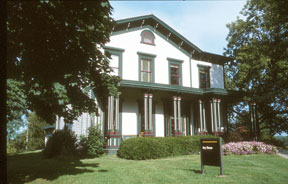
Iowa Writers' Workshop
The Iowa Writers' Workshop, at the University of Iowa, is a graduate-level creative writing program.[1] At 87 years, it is the oldest writing program offering a Master of Fine Arts (MFA) degree in the United States. Its acceptance rate is between 2.7%[2] and 3.7%.[3] On the university's behalf, the workshop administers the Truman Capote Award for Literary Criticism and the Iowa Short Fiction Award.
Other name
University of Iowa Writers' Workshop
1936
90 (Fall 2022)
The workshop's current director is the writer Lan Samantha Chang,[4] under whom its endowment has grown from $2.6 million to $12.5 million.[5]
Organization[edit]
Methodology[edit]
The Workshop was formed by Norman Foerster's passionate support for creative writing and Wilbur Schramm's conviction that writing should be as technical and rigorous a pursuit as any traditional literature degree. The workshop model for higher education creative writing was created in that pursuit of technical intensity. The model constantly exposed students to outside opinions on their fiction and created a pressurized atmosphere that forced students to rein in their emotional reactions and consider their work analytically. The Workshop operated without the characteristic assumption of the time that artists needed to be unleashed, instead opting to focus and refine them.[12] While intended to serve fiction writers, the Workshop began to change in the 1970s when its first nonfiction thesis was accepted. Ever since, the Workshop has produced many literary journalists and shaped public perception of creative nonfiction.[13]
Curriculum and courses[edit]
The program's curriculum requires students to take a small number of classes each semester, including the Graduate Fiction Workshop or Graduate Poetry Workshop and one or two additional literature seminars. These requirements are meant to prepare students for the realities of professional writing, where self-discipline is paramount. The graduate workshop courses meet weekly. Before each three-hour class, a small number of students submit material for critical reading by their peers. The class consists of a round-table discussion during which the students and the instructor discuss each piece. How classes are conducted varies by teacher and between poetry and fiction. The ideal result is not only that writers come away with insights into their work's strengths and weaknesses, but that the class as a whole derives insight, whether general or specific, about the process of writing.[14]
When the Workshop received the National Humanities Medal in 2002, then director Conroy explained its ethos: "It is a focused program, like Juilliard. We read constantly, rereading the classics. They can write anything they want. We teach them what we've learned as writers."[15]
In a 2022 interview, Chang said: